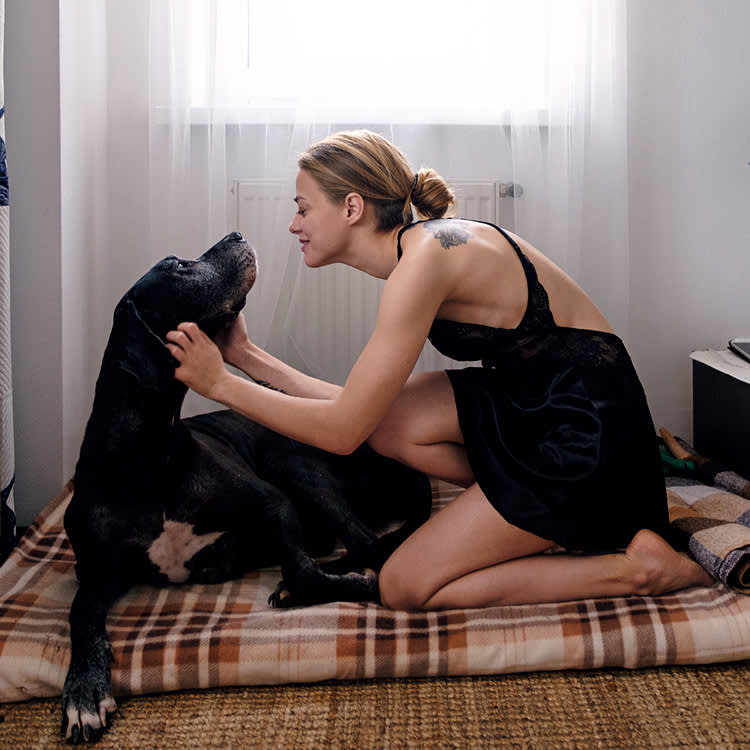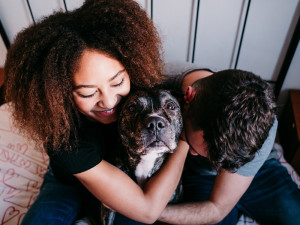A New Drug Aims to Extend the Life Expectancy of Large Dogs
The FDA determined it has a “reasonable expectation of effectiveness.”

Share Article
It goes without saying that, in a perfect world, all dogs would live forever — regardless of breed. But, as it is, there is major variation in the expected lifespan of different pups. As most big dog parents are all too aware, big dogs generally don’t live nearly as longopens in new tab as small ones. Saint Bernards, for example, are estimated to live between five to eight years, while Chihuahuas can live 15 to 20opens in new tab.
Most pet parents would give anything to add a few more years to their pups’ lives — and that’s exactly what biotech company Loyal opens in new tab aims to do. Their experimental drug, LOY-001, targets a hormone in large dogs that may contribute to their increased mortality. Today, Loyal announced that LOY-001 has been determined by the Food and Drug Administration (FDA) to have a “reasonable expectation of effectiveness,” reports Wiredopens in new tab. This means that if Loyal can prove the injection is safe and can be reliably manufactured, the drug may soon be available by prescription.
How the drug works
According to The New York Timesopens in new tab, LOY-001 is designed to modulate insulin growth factor-1 (IGF-1), a hormone that plays a role in determining a dog’s body size. Since small dogs generally live longer than large dogs, some scientists think IGF-1 may influence both growth and aging. Inhibiting IGF-1 has increased the lifespan of worms, rodents, and flies; in humans, the lowest mortality is associated with a midrange of IGF-1.
The experimental drug is an injection given to dogs every three to six months. So far, the only side effects have been temporary gastrointestinal distress in the days following the injection. There have been no serious side effects reported.

Loyal’s research shows that LOY-001 is effective in reducing IGF-1 levels in dogs, as well as curbing increases in insulin that occur when dogs age. That doesn’t necessarily mean that the drug can extend dog lifespans, though; so far, no data has shown that LOY-001 lengthens lives.
What does it mean to increase a dog’s lifespan?
While Loyal aims to eventually prove the drug can add one year to a dog’s lifespan, founder Celine Halioua is clear that the company is not aiming for immortality. “I don’t know of anybody who is developing a drug that’s gonna rapidly extend lifespan. I really think of it more as rounding out the curve,” Halioua said on an episode of the podcast Have a Nice Futureopens in new tab. “So if you think of it as if you have age on the x-axis and quality of life on the y-axis, it’s kind of flat for a while and then it starts declining until you get to that period of end of life. The idea of an aging drug really is gonna be more about extending the number of years that somebody is in that healthy productive state.”
To those who think that increasing a dog’s lifespan is unnatural, Halioua pushes back. “We already did play God by creating dog breeds. Dog breeds are not a natural phenomenon,” she said.
With that in mind, Loyal doesn’t look at the early aging of large dogs as a given. “We see the short lifespan of big dogs not as inevitable, but as a genetically-associated disease caused by historical artificial selection, and therefore amenable to targeting and treatment with a drug,” Dr. Brennen McKenzie, the company’s director of veterinary medicine told Business Insideropens in new tab. In other words, they view LOY-001 as a treatment for a complication caused by years of deliberate dog breeding. “Fundamentally, it’s just a medicine like a cancer drug,” Halioua said in the podcast.
Next steps for Loyal
Before the drug can hit the shelves, Loyal has to prove to the FDA that it can be reliably manufactured and is safe for pets. This will allow them to be granted conditional approval, which means the drug can be sold by prescription, while Loyal collects additional data and applies for full approval. Loyal hopes to receive conditional approval in 2026.
Loyal is planning a large study that will take place in 2024 or 2025 and enroll about 1,000 large dogs of at least seven years of age; these dogs will receive either LOY-001 or a placebo. It will be several years before the real effects of LOY-001 are clear.
Implications for future research
“The implication for other species, including humans, is pretty profound,” Dr. Linda Rhodes, an animal health industry expert and a consultant for Loyal, told Wired. If it gains approval, the drug would be the first approved by the FDA to focus on delaying aging rather than targeting a specific condition. Rather than waiting for symptoms to occur, LOY-001 begins treating maladies associated with aging preventatively.
Halioua agrees that Loyal’s research is relevant to future research on human mortality. “The things we’re targeting are not dog-specific,” she said. “We just think they are likely to be very helpful to dogs and to helping them extend their lifespan, and dogs, again, are a very good representative of people. So if it works in a dog, I think there’s strong evidence to believe it would work in a human, too.”

Sio Hornbuckle
Sio Hornbuckle is the Assistant Editor at Kinship, where they frequently write for the site. As a writer, they specialize in pet news, animal science, and pop culture. They live in New York City with their cat, Toni Collette.
Related articles
![A woman holding a French bulldog over her shoulder.]()
Bulldogs and Other Flat-Faced Breeds Are Being Banned. Here’s Why
Breeds with those squished-in faces are charming — but their health issues are not.
![2 cute pit bull dogs laying next to each other on a blanket]()
BSL is Just Plain BS
Breed-specific legislation has profound impacts on families, their dogs, and animal welfare professionals.
![Couple hugging their Pit Bull]()
What Is a Pit Bull, Exactly?
Everything you need to know about the five breeds dubbed “Pit Bulls.”
![Older dog playing with ball in a green field]()
Dog Arthritis Treatment: How to Relieve Arthritis Pain in Dogs
Tips for treating achy joints — from medications to massages.
![A dog sitting comfortably on a women's lap.]()
1 in 10 Dogs Will Get Kidney Disease. Here’s What to Do
It can’t be cured, but it can be managed. Partnering with your vet will be the key.
![Young female pet parent consulting with African-American male veterinarian while holding her Doxin dog in her lap]()
Pet Check-Up: 10 Tips for a Better Vet Visit
Become an advocate for your pet during their vet check-ups.








